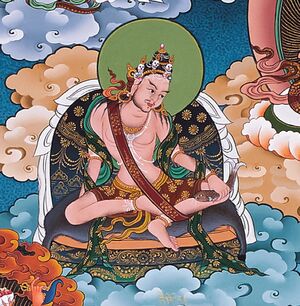No edit summary |
m (JeremiP moved page Topic of the week/Post-49 to Recent Essays/Post-49: Changing name) |
||
| (4 intermediate revisions by one other user not shown) | |||
| Line 3: | Line 3: | ||
|blogDate=October 2021, Week 1 | |blogDate=October 2021, Week 1 | ||
|blogTitle=Tilopa's Six Dharmas for Meditation | |blogTitle=Tilopa's Six Dharmas for Meditation | ||
|blogContent=The text [[Texts/Bka%27_yang_dag_pa%27i_tshad_ma_zhes_bya_ba_mkha%27_%27gro_ma%27i_man_ngag|''Instructions of Ḍākiṇīs entitled Validity of the True Word'']] (བཀའ་ཡང་དག་པའི་ཚད་མ་ཞེས་བྱ་བ་མཁའ་འགྲོ་མའི་མན་ངག) is one of the primary sources for Mahāmudrā meditation and the six yogas of Nāropa passed down through the Kagyu tradition. In this text, one finds the six dharmas of Tilopa (ཏི་ལི་ཆོས་དྲུག་), which are fundamental techniques for meditation to cultivate single-pointed concentration and nonconceptuality. These six features of meditation are captured by the following verse: | |blogImage=File:Tailopa.jpg | ||
|blogCaption=Tilopa | |||
|blogContent=The text [[Texts/Bka%27_yang_dag_pa%27i_tshad_ma_zhes_bya_ba_mkha%27_%27gro_ma%27i_man_ngag|''Instructions of Ḍākiṇīs entitled Validity of the True Word'']] (བཀའ་ཡང་དག་པའི་ཚད་མ་ཞེས་བྱ་བ་མཁའ་འགྲོ་མའི་མན་ངག) is one of the primary sources for Mahāmudrā meditation and the six yogas of [[Nāropa]] passed down through the Kagyu tradition. In this text, one finds the six dharmas of Tilopa (ཏི་ལི་ཆོས་དྲུག་), which are fundamental techniques for meditation to cultivate single-pointed concentration and nonconceptuality. These six features of meditation are captured by the following verse: | |||
:མི་མནོ་མི་བསམ་མི་དཔྱོད་ཅིང་། | :མི་མནོ་མི་བསམ་མི་དཔྱོད་ཅིང་།<br>མི་བསྒོམ་མི་སེམས་རང་བབས་གཞག ། | ||
:Do not reflect, think, or analyze, | :Do not reflect, think, or analyze,<br>Do not ponder or meditate, but let it be in the natural state. | ||
In the state of meditation particularly to still all mentation and conceptual construction, one should not reflect on the past, not think of the future, or analyze the current object. One must not contrive to meditate, or be occupied with present matters. | In the state of meditation particularly to still all mentation and conceptual construction, one should not reflect on the past, not think of the future, or analyze the current object. One must not contrive to meditate, or be occupied with present matters. | ||
}} | }} | ||
Latest revision as of 11:06, 29 April 2022
Tilopa's Six Dharmas for Meditation
The text Instructions of Ḍākiṇīs entitled Validity of the True Word (བཀའ་ཡང་དག་པའི་ཚད་མ་ཞེས་བྱ་བ་མཁའ་འགྲོ་མའི་མན་ངག) is one of the primary sources for Mahāmudrā meditation and the six yogas of Nāropa passed down through the Kagyu tradition. In this text, one finds the six dharmas of Tilopa (ཏི་ལི་ཆོས་དྲུག་), which are fundamental techniques for meditation to cultivate single-pointed concentration and nonconceptuality. These six features of meditation are captured by the following verse:
- མི་མནོ་མི་བསམ་མི་དཔྱོད་ཅིང་།
མི་བསྒོམ་མི་སེམས་རང་བབས་གཞག །
- Do not reflect, think, or analyze,
Do not ponder or meditate, but let it be in the natural state.
In the state of meditation particularly to still all mentation and conceptual construction, one should not reflect on the past, not think of the future, or analyze the current object. One must not contrive to meditate, or be occupied with present matters.
Weekly quote
~

